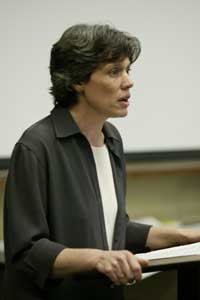Grant will fund study to track post-secondary CPS students
By William HarmsNews Office
 Melissa Roderick, Associate Professor in the School of Social Service Administration and Co-director of the Consortium on Chicago School Research, will lead a study to track student progress once they have entered college and/or the workforce. | |
The Consortium on Chicago School Research has received a $1.2 million grant from the Bill & Melinda Gates Foundation to track the progress of Chicago Public School students after they enter college and the workforce. The three-year grant will fund a unique partnership between the Consortium on Chicago School Research and the Chicago Public Schools to build a system that will allow CPS to track its students into college and work and will allow for research to guide new post-secondary efforts in the Chicago Public Schools.
Melissa Roderick, Associate Professor in the School of Social Service Administration and Co-director of the consortium, will be the lead researcher on the three-year study, which will look at post-secondary patterns in CPS students and the role high schools play in preparing students for their post-secondary plans.
“One of the reasons that high school administrators haven’t paid attention to the outcomes of their graduates is that they just don’t know what happens to their students,” she explained. “The first step is getting valid data that will help us understand where our students are going to college and how they are doing once they are there. The next step is to try to understand better how students’ high schools may be influencing those outcomes.”
Tied to CPS initiatives with the intent of improving the college and work outcomes of CPS graduates, the project focuses on a problem that puzzles education researchers: the widening gap between minority students’ aspiration and their outcomes. National research finds that despite dramatic increases in the proportion of racial and ethnic minority students who aspire to college and ultimately enroll in college, there has been little progress in improving the percentage of racial and ethnic minority students with four-year degrees.
To investigate this problem, CPS began a new Office of Postsecondary Education last fall that emerged out of a planning group led by Roderick, when she served as director of planning for CPS. “Unfortunately, our initial look at the post-secondary transition found that many of the problems that national research highlighted as issues for urban and minority students are amplified in CPS,” she said. “Too many students enter college and get placed in remedial courses, and despite significant improvements in test scores in CPS elementary schools, few CPS students graduate with ACT test scores high enough to make them competitive for college, few said they were attending a selective or highly selective college, and few students were looking at colleges outside the state system and the Chicago area.”
On the national level, studies show that fewer than half of African-American and Latino high school graduates have the coursework, grades and test scores they need to qualify for admittance to four-year colleges. The CPS enrollment is 51 percent African-American and 37 percent Latino.
“The purpose of our work is two-fold,” Roderick said. “The first is to get valid information on the outcomes of CPS graduates, and the second is to mount a research effort so that we may better understand how students’ experiences in high school are shaping their college and work outcomes.”
The project will combine information from an online student exit questionnaire, data from the National Student Clearinghouse that allows CPS to identify the enrollment of their students in college nationwide, information from local universities and community colleges on the early college performance of their students, and employment data to build a comprehensive tracking system of CPS graduates. The project will then link the tracking system to high school records and to student and teacher surveys.
The Bill & Melinda Gates Foundation grant will support future consortium reports that will identify ways in which CPS can provide more support in preparing students for college, including identifying how high school curricula, the level of support students receive in preparation for college and their college choices shape their college performance.
![[Chronicle]](/images/sidebar_header_oct06.gif)